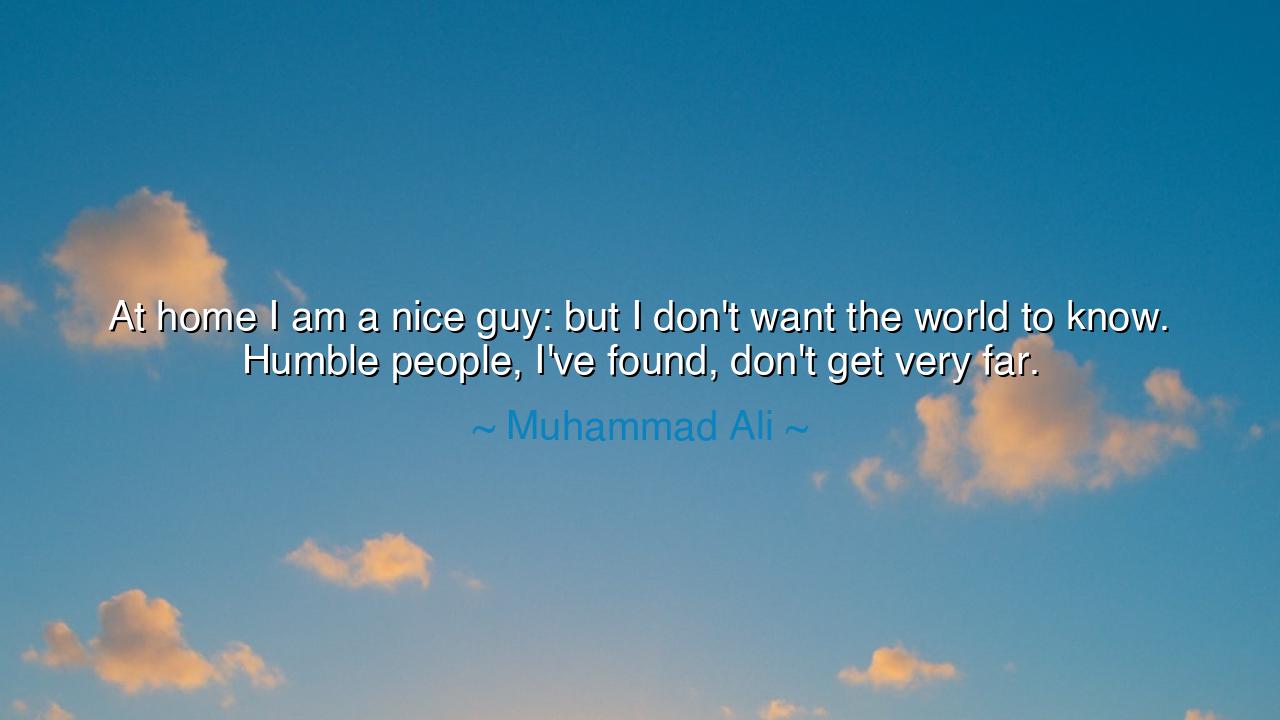
At home I am a nice guy: but I don't want the world to know.
At home I am a nice guy: but I don't want the world to know. Humble people, I've found, don't get very far.






“At home I am a nice guy: but I don't want the world to know. Humble people, I've found, don't get very far.” Thus spoke Muhammad Ali, the man who called himself The Greatest, and proved it in both body and spirit. His words are not the boasting of a vain man, as some might think, but the declaration of one who understood the nature of the world — its hunger for strength, its worship of confidence, and its fear of humility. In this quote, Ali reveals a truth older than the arenas he conquered: that to survive and triumph in the harsh theater of life, one must wear the armor of boldness, even when one’s heart is gentle.
The origin of this saying lies in the very fabric of Ali’s journey — from a boy named Cassius Clay in Louisville, Kentucky, to a global symbol of courage and conviction. In the ring, he was a lion, roaring his greatness before he even proved it. He called out his victories before the first bell, not out of arrogance, but to summon the power of belief. Yet behind the bright lights, at home and among his family, he was known to be kind, soft-spoken, and humble — a man who prayed, gave, and loved deeply. The public saw the thunder; his loved ones saw the rain. He understood that humility alone does not win battles in a world that crowns only those who dare to shout their destiny aloud.
The ancients too knew this paradox. The Greeks told of Achilles, whose mother warned him that to live humbly was to be forgotten, but to live boldly was to achieve eternal fame. Achilles chose glory — knowing it would cost him his life — for he believed that greatness requires not silence, but the voice of conviction. So too did Ali walk this path. He knew that if he whispered his worth, the world would not hear him. So he made himself a spectacle of faith, a poet of power. His self-proclamation — “I am the greatest!” — was not mere vanity; it was a spell, a self-forging prophecy uttered by a man who believed that words create worlds.
In truth, his bravado was a shield. The world in which he rose was not kind to men like him — a Black man in mid-20th century America, standing against injustice and refusing submission. His confidence was rebellion; his pride, defiance. When he said, “Humble people don’t get very far,” he was not scorning humility as a virtue of the soul, but as a strategy in a world that punished the quiet and crushed the meek. To survive, he had to transform humility into inner strength and boldness into weaponry. His voice, his swagger, his unshakable belief — these were his armor against a world that sought to silence him.
Consider the day he refused the Vietnam War draft. “I ain’t got no quarrel with them Viet Cong,” he said, and for that he lost his title, his license, his livelihood. Yet he stood firm. Behind the showman’s words was a conscience as immovable as stone. His boastfulness may have won him the ring, but his courage — quiet, moral, unyielding — won him eternity. It is here that the two sides of his nature unite: the humble man at home and the bold one before the crowd were not opposites, but mirrors of one truth — that greatness requires both gentleness and fire.
Ali’s wisdom is that the world does not reward the unseen virtues of the heart. It crowns those who dare to proclaim themselves when no one else will. This is not an invitation to arrogance, but a challenge to self-belief. One must not mistake modesty for shrinking, nor humility for silence. To rise in the world, a person must learn to carry their worth like a banner — not to impress others, but to remind themselves of who they are when doubt surrounds them. As Ali showed, humility belongs in the heart; confidence belongs on the battlefield.
The lesson, then, is timeless: cultivate humility in your soul, but let confidence rule your stride. Be gentle in spirit but fierce in purpose. Know your worth, and do not hide it from the eyes of those who would diminish you. The world remembers those who stand tall, who speak their truth, who live boldly. As Muhammad Ali taught us, the truly great are not those who are humble before men, but those who are humble before God, and fearless before all else.
So live as he lived: with quiet kindness behind closed doors, and with thunder in your voice when you face the storm. For life demands both the lion and the lamb — humility for the soul’s peace, and boldness for the soul’s survival. And in the union of the two, as Ali knew, lies the essence of greatness.






AAdministratorAdministrator
Welcome, honored guests. Please leave a comment, we will respond soon